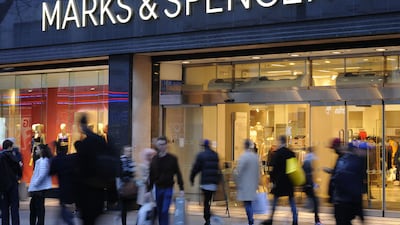Britain’s Marks & Spencer raised its profit forecast for the second time in less than three months on Wednesday.
This sent its shares surging by 18 per cent in early trading on Wednesday to their highest level since January 2020.
Improving food sales helped to turn around the post-coronavirus fortunes of the 137-year-old clothing and food group after it beat first-half profit forecasts.
The company expects full-year profits of about £500 million, a leap from its previous estimate of £350m.
The high street chain made a profit before tax and adjusting items of £269.4m in the six months through to October 2 versus analyst forecasts of £205 to £264m.
In the same period last year, it made a loss of £17.4m at the height of the pandemic.
The positive figures drove the share price up by as much as 18 per cent in early trading, before paring back to a rise of 16.23 per cent at 8.59am London time to £2.26.
Steve Rowe, chief executive of M&S, said the company has made it clear it “won’t overclaim" its progress despite the positive numbers but indicated that the shop's turnaround appears to be on track.
“Unpacking the numbers is not a linear exercise and we have called out the Covid bounce-back tailwinds, as well as the headwinds from the pandemic, supply chain and Brexit, some of which will continue into next year," Mr Rowe said.
“But, thanks to the hard work of our colleagues, it is clear that underlying performance is improving, with our main businesses making important gains in market share and customer perception. The hard yards of driving long-term change are beginning to be borne out in our performance."
The upbeat outlook comes after a decade spent battling to turn around its brand, with management focusing on transforming the company's outdated culture, improving the quality and value of its clothing and food products while reshaping its store estate and investing in technology and e-commerce, including a venture with online supermarket Ocado.
The company believes the pandemic has masked the progress management has made in its latest turnaround efforts after years of false dawns.
The improved performance in its half-year results was largely driven by rising food sales, which were up 10.4 per cent in the first six months of the year, when more people cooked at home during the lockdown.
While its clothing division was affected by shop closures, revenue was only down 1 per cent.
Susannah Streeter, senior investment and markets analyst at Hargreaves Lansdown, said the M&S figures show how lucrative the food arm of the business has become.
"Marks & Spencer may have been late to the grocery e-commerce party but arriving with Ocado in arm, it has muscled into a prime spot on the dance floor and is enjoying the hits. It looks like this long-suffering high-street stalwart has turned a sharp corner, proof that management’s transformation strategy is paying off, and investors have cheered on the news with shares rising 18 per cent in early trading."
M&S may also have gained from the closure of so many rival department stores. Britain has lost 83 per cent of its main department stores over the past five years, amid the fallout from the Covid-19 pandemic and changing shopping habits.
Almost two thirds of the closed shops remain unoccupied, according to an August study from commercial property information company CoStar Group, with about 237 large shops yet to be taken over by a new business.
While M&S may be benefitting from less competition, the brand still raised the alarm over "significant" supply chain cost rises over the second half, which it said will continue into the new financial year.
It said it is struggling to deal with shortages for lorry drivers, warehouse and supplier staff, all of which are particularly affecting its Ocado Retail joint venture.
The company said it is raising pay to attract and retain staff, "which will put pressure on costs in the remainder of our financial year". But it said the food arm is "well placed" for the challenges.
M&S said profits are still set to top expectations, with the trading rebound continuing into the second half so far.
"We expect the strong demand relating both to the bounce-back and improved customer perception to be sustained in the near term," the group said.
However, Ms Streeter said the supply chain issues affecting homewear and clothing right now mean there could be shortages in ranges until next Spring.
"Given the supply issues and also the lower demand for smarter outfits M&S is known for, as so much of the workforce continues to work from home, it is likely recovery in this part of the business will be slow," she said.


